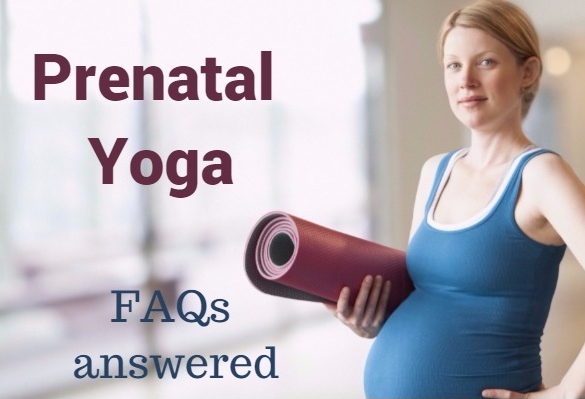 Prenatal yoga has emerged as a very reliable way to address the physical challenges of pregnancy, such as a shifted center of gravity and lower back pain. In this article, we address some FAQs (Frequently asked Questions) related to Prenatal yoga and pregnancy exercises.
Prenatal yoga has emerged as a very reliable way to address the physical challenges of pregnancy, such as a shifted center of gravity and lower back pain. In this article, we address some FAQs (Frequently asked Questions) related to Prenatal yoga and pregnancy exercises.
Specific prenatal exercises help relieve pregnancy aches and build strength in your legs, back and abdominals to prepare you for giving birth. Yoga also can ease labor and delivery, with moves that relax the hip muscles and use gravity to your advantage.
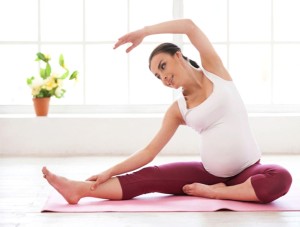
Q. When to start prenatal yoga?
Pregnancy is usually discovered by 5th week and sonographically confirmed by 8th week. However 13-14 weeks is when pregnancy is usually known to get well established. A pregnant woman can usually start exercising after this time ie from 15th week of conception, unless your supervising doctor has specifically directed you not to.
Q. Not done yoga / exercise before?
Consider prenatal yoga a way to get physically stronger and emotionally healthier during pregnancy. Even if you’ve never done any sort of workout before, the customised prenatal exercises taught at FabMoms, are both safe and beneficial to expectant moms. Plus, women with difficult pregnancies may find comfort in the gentle motions and breathing. Priya Oommen comments for her prenatal sessions at FabMoms, “This is a very excellent place to get to know how to calm yourself (as I am very anxious for small things as well) and learning on how to ease your pain during labour.“
Q. Which class to join for prenatal yoga?
There are many important factors to take into account when choosing to learn prenatal yoga.
The safest way is to take a class designed for pregnant women (prenatal yoga). It is important you look for classes taught by a certified prenatal instructor, as they are familiar with the specific poses to avoid and which ones to focus on.
Q. What kind of prenatal exercise : yoga vs exercise?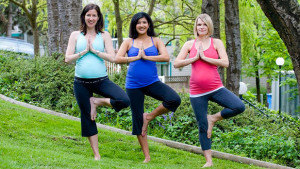
A combination of stretching and strengthening exercises is a ‘must’ for any pregnant woman. These should be done strictly under supervision of a prenatal expert. You could choose to do these prenatal exercises with a trained yoga practitioner or under the supervision of a qualified physiotherapist.
If you have been doing yoga even before pregnancy, then you are likely aware and enjoy yogic practices. Yoga does two things while you’re pregnant: It’s a physical form of exercise that’s also going to bring some mindfulness via meditation [Om chanting] around all the changes going on, in your pregnant body.
However, those of you who do not particularly appreciate and find meditation exciting, should opt for general prenatal fitness with a physiotherapist. A Physiotherapist will also include cardio exercises and additionally be able to safely attend to any aches and pains rising due to pregnancy. FabMom Firdos Arbab says, “Pain management as a part of their programme really came as a boon to me... prenatal therapist at FabMoms really helped me a lot by way of education. ..exercises…my beliefs… fears…”
Whichever prenatal regime you opt for, ensure that it includes breathing practices for relaxation. These practices will help you stay focused and stay free of stress that very often builds up as a result of fluctuating pregnancy hormones.
However tired you may be, remember that Prenatal exercises are stimulating, relaxing, strengthening and stress
Q. For how long should you do prenatal exercises?
Once you start prenatal exercises, continue till you deliver.
If you are not able to exercise under supervision throughout your pregnancy, owing to your work or travel status – you could learn a set of basic prenatal exercises and keep practicing them on your own. Remember – “Something is better than Nothing!”
However, you are likely to benefit the MOST if you continue your prenatal exercise regime under supervision, right unto the time you deliver. The nature of prenatal exercises is likely to change as your pregnancy progresses. It is not a simple formulae. Some exercises may progress while others may not. Some exercises may not be safe early on while you may be asked to do advanced poses of those during the later stages and vice versa.
Following general principles will help you understand it better: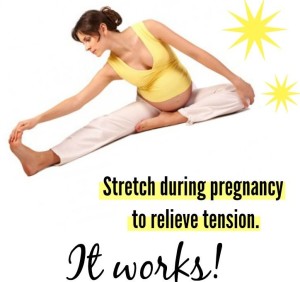
A) You could keep doing the same stretching exercises for most part of your pregnancy. These will help keep your bloating body supple and ready to open for delivering the baby, when time comes.
B) Strengthening exercises will benefit you optimally only when you progress and improve your strength. The strength that you as a pregnant women will build during the second trimester can easily be improved and maintained specially during the 8th and 9th month. This strength will keep you:
- Free of aches and pains, owing to the rising weight and growing belly in 8th and 9th month
- Build your stamina, to bear and sail through the process of labor
- Keep your body strong, to handle your infant as you recover after child-birth
You cannot expect to start afresh with strengthening exercises once you are in 8th month.
C) Specific bearing down exercises will be introduced only in the later stages of pregnancy. These will build the muscles of your lower body in preparation for the child-birth.
D) Breathing exercises can be continued throughout pregnancy. However, there are certain select breathing techniques that can be learned and practiced to specifically cope with labor pain [enquire for Labor Preparation module at FabMoms]. These are best started in 8th or 9th month of pregnancy ie close to your EDD (expected delivery date)
Q. What else you need to know?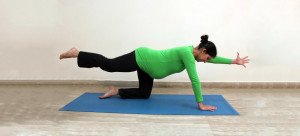
Remember to moderate your prenatal routine to about 30-40 minutes and to never push yourself. Prenatal exercise is a means to relax, so there is no reason to push yourself, which isn’t safe or healthy for an expecting mother.
While there are many benefits to prenatal exercises, it is important to remember not all exercises are safe for pregnant women.
Any poses in which you lie flat on your back, or require a lot of abdominal stretching, are also not recommended for pregnant women.
Additionally, women who are at risk of premature labor are not recommended to practice prenatal yoga / exercises. It is important to consult your doctor before starting prenatal yoga/ exercises.
